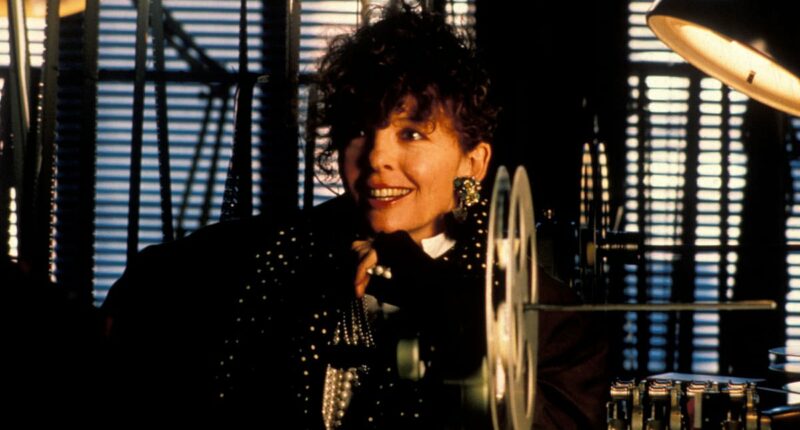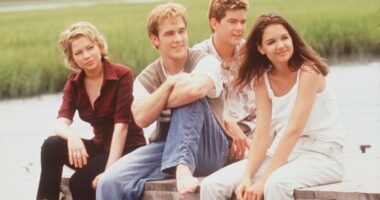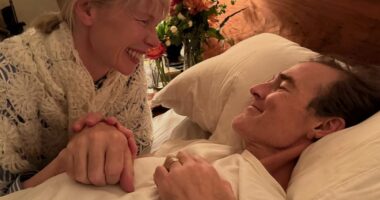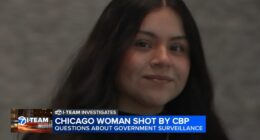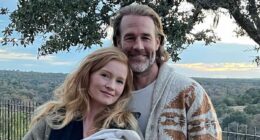Share this @internewscast.com
As the world continues to mourn Diane Keaton and remember her amazing legacy, the Daily Mail is taking a look at Heaven, the documentary she directed exploring the concept of an afterlife.
The Oscar-winning actress, who died on Saturday at the age of 79, released the one-hour and 20-minute long documentary in April 1987.
Diane Keaton’s daring documentary stands out as her sole foray into directing in this genre, though she has donned the director’s hat for various other projects, including feature films and music videos. Among her television ventures, she directed episodes of acclaimed series like the cult classic “Twin Peaks,” originally created by the late David Lynch.
In creating her documentary, Keaton sought a broad spectrum of voices. Her interviews spanned a diverse group, pulling insights from atheists, religious figures, children, and couples alike. This eclectic mix offered a multifaceted perspective on the subject matter.
Intriguingly, Keaton’s documentary also featured appearances from her own family members, who shared their thoughts on camera. Notable personalities like boxing promoter Don King also lent their voices, adding depth and variety to the interviews.

As the world continues to mourn Diane Keaton and remember her amazing legacy, the Daily Mail is taking a look at Heaven, her 1987 documentary, which delved into the concept of an afterlife

The Oscar-winning actress, who died at the age of 79 on Saturday, released the one-hour and 20-minute long documentary in April of 1987. Pictured in NYC in 2023
Keaton’s unique vision for the documentary was further enhanced by her incorporation of classic film footage. She drew upon cinematic works such as “Metropolis” (1927), “Green Pastures” (1936), and “Stairway to Heaven” (1946), which contributed to the film’s distinctive and avant-garde atmosphere.
In a 1987 interview with Vanity Fair, Keaton expressed the joy she found in the creative process of selecting and editing for her documentary, “Heaven.” It was an experience that deeply resonated with her artistic sensibilities.
“Maybe what I’d like to do in heaven is look at images forever and select them,” Keaton mused, capturing her passion for visual storytelling.
At the time, critics reviews were varied.
Late film critic Vincent Canby wrote in The New York Times that he found it to be ‘dumbfoundingly silly,’ and unkind to the people who appeared in it.
The late Roger Ebert said that the interviews in the documentary could have used more structure.
‘Some of the answers she receives are memorable, or funny, or moving,’ Ebert said at the time. ‘Most are not; most are simply opinions from random subjects who have no particular credentials – except, of course, that like all of us they will someday either be, or not be, in heaven.’
Ebert said some of the responses from those interviewed struck him as ‘too clever’ and ‘too thought out.’

Boxing promoter Don King made a surprise cameo in the 1987 documentary

Keaton incorporated an array of interesting footage into the doc, adding to the edgy vibe

Keaton said making the documentary convinced her there was no hell
Keaton showed an ‘excessive attention to visual detail’ and that ‘perhaps a sloppier film would have been a better idea,’ Ebert said.
He added that there were moments in the documentary he was glad he saw, and that it would have worked better as ‘a short film of 30 or 40 minutes.’
Keaton expressed her own views on the afterlife in a 2001 interview with the Golden Globes, while she was promoting the dramatic comedy Sister Mary Explains It All.
‘I don’t believe in hell, I can’t really accept hell as a concept at all, that kind of punishment is absurd,’ Keaton said.
In the interview, she referred back to the documentary and the value she got from it.
‘I made a movie about heaven many years ago and that really cleared it up for me. It’s very simple: Why on Earth would people have to burn for all eternity?
‘Why would there be such a place as hell, for any of us?
‘First of all I can’t even visualize it, the concept is so abstract, then nobody deserves it, ever. So, I just don’t believe that.’


For the documentary, Keaton cast a wide net for interview subjects – a group which included atheists, religious leaders, kids and couples among those providing their thoughts on the topic

Keaton showed ‘excessive attention to visual detail’ in the doc, Ebert wrote in 1987

Ebert added that there were moments in the doc he was glad he saw, and that the it would have worked better as ‘a short film of 30 or 40 minutes,’ instead
Keaton had been with loved ones when she died, a relative told the Associated Press. Her surviving family members confirmed to People that she died of pneumonia on October 11.
Keaton had become increasingly reclusive in the past year. One longtime friend, songwriter Carole Bayer Sager, told People how shockingly thin Keaton had become before her death.
Keaton leaves behind an amazing legacy in Hollywood, with some of her performances in the 1970’s hailed as the decade’s best.
They included the titular role in the 1977 comedy Annie Hall, which was written and directed by Woody Allen, with whom she collaborated on a number of memorable projects.
In 1978, Keaton claimed the Best Actress in a Leading Role award for her work in Annie Hall, her first of four lifetime nominations.
She also received nods for her work in movies such as Reds (1981), Marvin’s Room (1996) and Something’s Gotta Give (2003).
Other notable movies included Baby Boom (1987), The First Wives Club (1996) and the Father of the Bride films (1991 and 1995).
